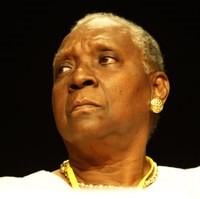Point-à-Pitre (Guadalupe), 1934
By Adriana Veríssimo
The writer Maryse Condé, born in Point-à-Pitre on February 11, 1934, was orphaned as a child. In 1953, she traveled to Paris, where she studied at the Lycée Fénélon and the Sorbonne. She completed her doctorate in comparative literature at the University of Paris III in 1975. Her research addressed black stereotypes in Caribbean literature.
She lived for twelve years in West Africa: Guinea, Ghana, and Senegal, where she taught French. During this time, she understood what it meant to be a black woman born in Guadalupe, a society where the most important positions were held by whites. Her areas of interest are slavery, Africa, and the condition of black people in the world. She says she writes to respond to her intimate concerns.
Some critics label her a feminist because she creates strong female characters, to which she replies that she was raised by a strong woman and a strong grandmother, and therefore it is impossible not to convey that in her writing. Names like hers are, in the opinion of specialized critics, fundamental to understanding the concept of negritude in literature. She published the books Heremakhonon (1976), Ségou (1984), with which she stood out in contemporary Caribbean literature, Corações migrantes (2002), among other novels, and won important literary awards. She is an emeritus professor at Columbia University in New York City, United States.




